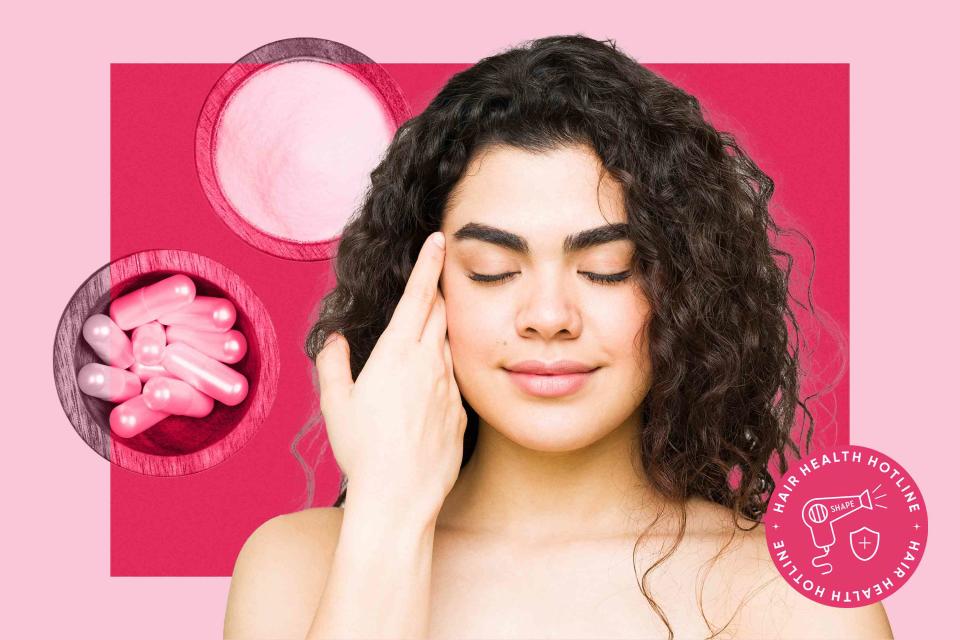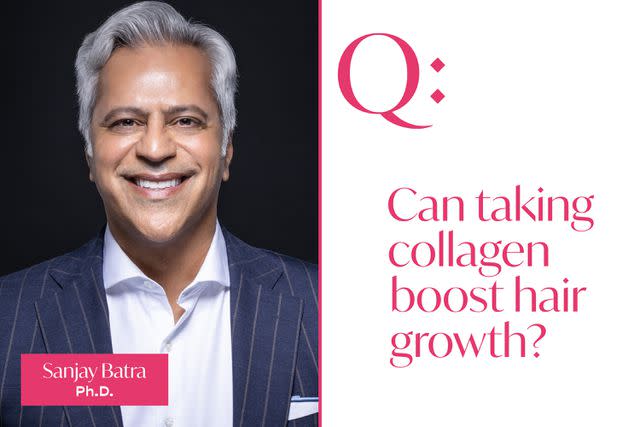Why Taking Collagen for Hair Growth Can Pay Off
If you're thinking of taking collagen supplements for the purposes of boosting hair growth, here's what you should know.

Collagen supplements have been a trendy wellness item for a hot minute, thanks in part to major endorsements from the likes of Jennifer Aniston and Kourtney Kardashian. Of course, with wellness trends as a whole, popularity isn't directly proportional to effectiveness.
Brands sometimes position collagen supplements as a "hair, skin, and nail" aid, and while you've likely heard about collagen's role in skin, you might still have questions about whether the protein can boost hair growth. Here, Sanjay Batra, Ph.D., regenerative medicine and hair loss expert and co-founder of WeThrivv, shares whether collagen supplements' hair growth benefits are legit, plus how to decipher the differences between supplements when shopping.
Q: I keep seeing collagen supplements on social media and I'm wondering if they actually work. Does taking collagen increase hair growth?
A: Taking collagen supplements can help boost hair growth, by providing your body with essential amino acids that it can't produce on its own and producing peptides that signal rejuvenation and repair, according to Batra.
"Collagen, the most abundant protein in your body, is a primary building block for healthy bones, skin, muscles, tendons, and ligaments," says Batra. "Keratin, on the other hand, is a protein that makes up much of your hair, skin, and nails." That being said, collagen still plays a role in hair health.
:
What's the Connection Between Hair Growth and Collagen?
"Collagen’s role in hair is mainly beneath the scalp," says Batra. Supplementing collagen may increase activity of cells called fibroblasts in your skin, which send signals to cells at the base of hair follicles responsible for making new hair. This can result in hair growth, with the caveat that overstimulating the fibroblasts can actually trigger the cells at the base of the hair follicles to stop making hair, says Batra.
"Collagen levels decline as people age, and this loss usually begins around the age of thirty," says Batra. Taking collagen supplements for hair growth may work, but the reason why isn't as straightforward as you might think. The collagen you ingest doesn't just get added to your existing collagen; instead, your body breaks down the collagen during a digestive process, says Batra.
More specifically, when your body digests collagen, the process produces a lot of fragments of a peptide called glycyl-L-histidyl-L-lysine (GHK), explains Batra. Then, the GHK fragments link up with copper in your body to form copper tripeptide-1 (GHK-Cu), he says. "GHK-Cu is well known in the hair loss world, appearing in serums, administered in the form of injections, and taken as a dietary supplement for many hair supplements," says Batra.
What's more, collagen digestion produces amino acids called lysine, histidine, and arginine, points out Batra. "Studies have demonstrated that by supplementation of these specific amino acids, hair rejuvenation can be supported, particularly if these amino acids are supplemented in conjunction with a tandem hair loss initiative such as minoxidil, finasteride, or a natural treatment such as Revivv," he says.

How to Choose the Best Collagen for Hair Growth
If you decide you'd like to start taking collagen for hair growth (or to enjoy the other benefits of collagen), you've got multiple types of collagen to choose from. For starters, some supplements have whole collagen, while others have hydrolyzed collagen (meaning collagen broken down through a chemical reaction with water). "The latter is better because specialized enzymes are used to break the collagen into amino acids and peptides, the fragments that can be absorbed into the bloodstream," says Batra. "These special enzymes can break the amino acid chains in the right place, to create bioactive peptides that are relevant to human health."
:
You also have the choice between collagen that's sourced from animals (collagen sourced from sea creatures or gelatin, a form of collagen sourced from cows or pigs) or is vegan (made from marine sponges), notes Batra. While vegan collagen is the obvious winner if you follow a vegetarian or vegan diet, animal-souced collagen has its advantages. "A good collagen is rich in lysine, a positively charged amino acid that cannot be made by the human body and is present in many of the good peptides in human health," and gelatin from cows is rich in lysine, says Batra.
Long story short, taking collagen for hair growth may pay off, particularly if you aren't getting enough protein in a day otherwise. And not all collagen is created equal, so it can be helpful to compare options (and check in with a medical professional!) before adding one of the supplements to your routine.

